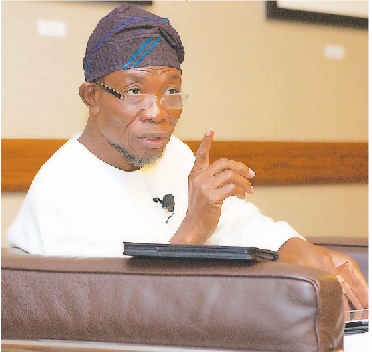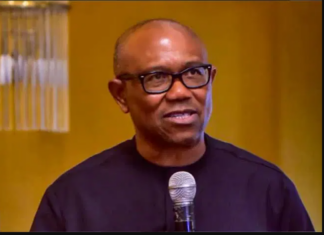Assistant Politics Editor, DANIEL KANU, takes a look at the states grappling with unpaid salaries, their profile, what went wrong, underlying politics and bail-out moves.
That many states in the federation owe their workers several months’ salaries is no longer in dispute. In fact, at the last count, not less than 18 of the 36 states in the country are technically bankrupt. What perhaps appears not to be quite clear is the number of months being owed by the affected states.
While some of the governors involved have served their two terms and are no longer in office, some are still in office for their second term.
Already, in some of the states, the workers have embarked on strikes, shutting down institutions of governance and economic activities.
It was gathered that other states will soon join in the protest if nothing drastic is done to arrest the situation. The excuse from the governors of those states is that Abuja is culpable, given the dismal revenue they have been receiving from the federation account, lately.
TheNiche investigation indicated that some of the states in the mess have mortgaged their federation account allocations to contractors.
This, they have done by signing irrevocable payment orders with various banks. The implication is that, payment to contractors and other debt instruments are deducted at source and have become first line charge on their slim resources.
Debtor-states on parade
Going by the compilation of the Nigeria Labour Congress (NLC), the defaulting states, which vary in their different grade of indebtedness, are Abia, Akwa Ibom, Bauchi, Benue, Cross River, Ekiti, Imo, Jigawa, Kano, Katsina, Kogi, Ogun, Ondo, Osun, Oyo, Plateau, Rivers and Zamfara.
Our reporter gathered that most states finding it difficult to finance their programmes had resorted to borrowing. Some also had gone to the bond market to borrow without the money being judiciously used for the development of the state, rather on white elephant engagements. The external debt profile of states has shown that Lagos has the highest with a profile of $1.087 billion, followed by Kaduna with a total of $234 million. Cross River followed closely with an external debt profile of $131.469 million.
Other states, going by the records, with relatively large external debt are Edo $123 million, Ogun $109 million, Bauchi $87 million, Enugu $62 million, Katsina $78 million, Osun $67 million and Oyo $72 million. Based on the rising debt profiles of state governments, the federal government last year directed banks not to grant fresh loans to state governments until they got the relevant approval and clearance from the Federal Ministry of Finance.
The federal government had defended its decision to dissuade banks from granting unsecured loans to state governments, saying it was to protect the states from excessive accumulation of debts.
Road to the unknown
Experts are in agreement that it was obvious and a matter of time, that the low price in the international market would expose the structural deficiencies in the Nigerian economy and by extension plunge a number of states into financial crisis.
They had argued that with oil contributing about 70 per cent of Nigeria’s revenue, the drastic drop in oil price would significantly curtail government revenue and, invariably, expenditure.
It was certain that with government (state and federal) as the biggest employer of labour in the formal sector, the expected pressure on state governments’ finances would have negative implications for income.
Findings also show that the internally-generated revenue (IGR) profile of states has been quite poor though rising in total amount.
The poor IGR performance of states, economic authorities contend, started with the discovery of oil in commercial quantity in the country. Consequently, there has been the tendency to ignore other non-oil revenue yielding activities. While the oil boomed, there were also no strategic consideration towards putting in place safety nets to absorb the inevitable shock in the event of price drop.
With the sharp and sudden drop in oil prices, IGRs of these states have not been enough to meet their obligations; hence they owe workers several months of salaries.
Analysts have continually blamed the inability of states to pay salaries on their over-dependence on allocation from the federation account. They are of the view that majority of the states had, over the years, failed to look at alternative sources of generating revenue to drive their activities.
Available data shows that only few states, perhaps because of their advantage positions in the country, have the capacity to generate solid IGR. For instance, the National Bureau of Statistics (NBS) and Joint Tax Board (JTB) indicated that five states – Lagos, Rivers, Delta, Edo and Akwa Ibom – recorded the highest IGR in the years spanning 2010 to 2013.
Lagos dominated in 2010, Rivers followed with N173.1 billion, while Delta realised N106.4 billion.
From the revenue profile of state governments, what is glaring is that they cannot finance on their own the overhead cost of running their states.
The Soludo alert
This is not the first time states owe workers. Back in 2003, then Economic Adviser to President Olusegun Obasanjo, Professor Charles Chukwuma Soludo (later Central Bank of Nigeria Governor), had raised the alarm that most state governments had signed away their future statutory allocations to contractors they owed.
This, he explained, was why many states were technically bankrupt and could not fund developmental projects, due to huge deductions made from their allocations to pay such creditors.
Soludo said, after the deductions from the federation account, the states were left with little or nothing to operate with, in terms of performing statutory obligations.
“The problem of states in the federation is their total dependence on the federal government. Their internal revenue drive and generation are so weak that no state can operate without federal allocation or grant in some cases,” he noted.
Further investigation indicate that most of the states go into further indebtedness through heavy borrowing and undertaking projects they have no financial capacity to carry.
Enter finance commissioners
Weighing in on the issue, the Forum of Finance Commissioners, had, last April, openly criticised governors who defaulted in payment of workers’ salaries, stressing that they had no reason for the action.
The then Chairman of the Forum, Timothy Odaah (Ebonyi State), had told journalists at the end of the Federation Accounts Allocation Committee (FAAC) in April that those owing should have made payment of salaries a priority, rather than spending state funds on electioneering, adding that they should be held responsible by the workers and the public.
Many agree with the commissioners. In fact, some governors were accused of squandering their resources on unprofitable ventures such as hiring and flying private jets and engaging in excessive political appointments. Such governors, it is argued, did not use the resources at their disposal to develop the economy of their states. As a result, they could not generate internal revenue to support the state.
Reacting to the high indebtedness of states, Director-General, Securities and Exchange Commission (SEC), Mounir Gwarzo, condemned the indebtedness of some state governments whose debts did not measure up with infrastructural development in them. He described the incidence as a bad omen, more so where there is no infrastructure in place to underpin their debts.
Gwarzo, therefore, advised the affected state governments to take advantage of equities, bonds or mortgage bond securities in the capital market to develop their states’ infrastructure. He urged governors to explore the opportunities available in the market to develop infrastructure for their people, saying it is better to borrow to meet infrastructural needs than to be content with just paying salaries.
States on defence
Some of the states have started to react to the report that they owe salaries running over five to 10 months.
Ekiti, last week, spoke on its indebtedness to workers in the state, insisting that only the May 2015 salary was being owed by the Governor Ayodele Fayose-led administration.
Special Assistant to the governor on Public Communications and New Media, Lere Olayinka, in a release had stressed that “the only salary yet to be paid by the Fayose-led administration is that of May 2015”.
He noted that the immediate past APC government of Kayode Fayemi refused to pay August and September 2014 salary, despite receiving federal allocation for those months.
From Abia, the immediate past Commissioner for Finance, Dr. Philip Nto, told TheNiche that the state under now Senator Theodore Orji was never in the league of states that were owing salaries for months.
He said salaries were always paid as and when due, unless when the allocation was delayed from Abuja or during the time oil price crashed and allocation from the federal government reduced drastically.
“It was only when there were delays from the release of the allocation from Abuja or during the time we started witnessing crash in the oil price that delay in payment was experienced. Anybody telling you that Orji owed for three months for all civil servants in the state wants to play politics. There were few parastatals that their salaries were delayed for obvious reasons. You must judge the state by the money at its disposal. Given that standard, Orji did well,” Nto submitted.
Osun State governor, Rauf Aregbesola, has, on his own, appealed to workers to be calm, saying their salaries will be paid before June 30.
“I want to appeal to workers to be calm as the period of hardship caused by the delay in the payment of salaries will end very soon. We are with them in their pains; we are not immune to any of their pains. Before the end of this month, we will all put this terrible experience behind us,” the governor assured when the Australian High Commissioner to Nigeria, Jonathan Richardson, visited him at Osogbo.
Imo State was equally alleged to be owing its workers 11 months salary arrears. But Chief Press Secretary (CPS) to the Governor, Sam Onwuemeodo, put a lie to the allegation.
Onwuemeodo had, in a statement, claimed that the “Government only owes its civil servants May salary and the payment for that month is at the verge of being made.
“We have decided to make this factual claim on the salaries of the civil servants and teachers in the state, so that those behind the report that we are owing 11 months can come out with their own facts to back their claim.”
Toying with bail-out
Obviously overwhelmed by the embarrassing situation, governors on the platform of All Progressives Congress (APC) made strong case for a bail-out for cash-strapped states, to enable them pay outstanding workers’ salaries.
Imo State Governor, Rochas Okorocha, chaired the Forum.
“We are concerned and worried by the dwindling revenue of the states which today has affected negatively the lives of our people.
“It has become so serious and urgent actions must be taken for a bail-out for the states,” Okorocha told journalists after their meeting.
But on Wednesday, June 17, the 36 state governors also met in Abuja on the same issue of financial crisis crippling the states, but agreed to shove bail-out option, suggesting rather that the federal government should pay debts owed states.
The governors also resolved to meet President Muhammadu Buhari on how to plan for the re-payment, so that states can utilise the funds for their salaries.
“The federal government owes some states up to N10 billion, N20 billion, N30 billion, and Lagos State N50 billion for federal jobs executed. So we would be asking the federal government to settle the backlog owed to the states,” Chairman of the Nigerian Governors Forum (NGF), Abdulazeez Yari, disclosed.
Some critics say there was no need asking for a bail-out when some states with sheer commitment to good governance coped with the challenges.














